Navigation
Install the app
How to install the app on iOS
Follow along with the video below to see how to install our site as a web app on your home screen.
Note: This feature may not be available in some browsers.
More options
Style variation
You are using an out of date browser. It may not display this or other websites correctly.
You should upgrade or use an alternative browser.
You should upgrade or use an alternative browser.
Covid-19 News and Discussions
- Thread starter Yommie
- Start date
Yommie
Elite Member
- Oct 2, 2013
- 64,110
- 37,185
- Country of Origin

- Country of Residence

- Thread starter
- #1,938
U.S. will again offer free at-home Covid tests starting in late September
Published Fri, Aug 23 202412:08 PM EDTUpdated an hour ago
Annika Kim Constantino@annikakimc
WATCH LIVE
Key Points
- The Biden administration will resume offering free at-home Covid tests to American households in late September amid a summer surge of the virus.
- Americans will soon be able to use COVIDtests.gov to request four free tests, administration officials told reporters.
- The tests will be able to detect the currently circulating Covid variants, most of which are descendants of the highly contagious omicron variant JN.1.

Images By Tang Ming Tung | DigitalVision | Getty Images
The Biden administration on Friday said it will resume offering free at-home Covid-19 tests to American households in late September as the virus has gained a stronger foothold in the U.S. this summer.
Americans will soon be able to use COVIDtests.gov to request four free tests, administration officials told reporters during a briefing. The tests will be able to detect the Covid variants that are currently circulating, most of which are descendants of the highly contagious omicron variant JN.1.
“These tests will help keep families and their loved ones safe this fall and winter season,” Dawn O’Connell, an assistant secretary for preparedness and response at the Health and Human Services Department, said during the briefing. “This is the seventh time over the last three years that the Biden-Harris administration has given families the opportunity to order the over-the-counter Covid-19 tests for free” through the government’s website.
The government’s program has provided more than 1.8 billion free over-the-counter Covid tests to Americans since it started in 2021, according to O’Connell.
The government is relaunching the program amid a relatively large spike in Covid cases this summer, and ahead of the fall and winter, when the virus typically spreads at higher levels each year. There is a “high” or “very high” level of Covid being detected in wastewater in almost every U.S. state, according to data from the Centers for Disease Control and Prevention.
But the government decided to reopen the program in late September because it’s when more Americans begin to travel and gather indoors with loved ones.
“As people start to travel, as they start to get together with friends and family through the holidays, we want them to have those four tests available to them at that time,” David Boucher, director of infectious disease preparedness and response at HHS, told reporters during the briefing.
By then, the latest round of Covid shots from Pfizer and Moderna will be available to most Americans in pharmacies, health clinics and other locations nationwide. The Food and Drug Administration approved those shots, which target a JN.1 offshoot called KP.2, on Thursday.
Testing is a critical tool for protection as Covid infections climb again. But lab PCR tests — the traditional method of detecting Covid — have become more expensive and less accessible for some Americans since the U.S. government ended the public health emergency in May last year.
Still, certain local health clinics and community sites offer at-home tests to the public at no cost.
Yommie
Elite Member
- Oct 2, 2013
- 64,110
- 37,185
- Country of Origin

- Country of Residence

- Thread starter
- #1,940
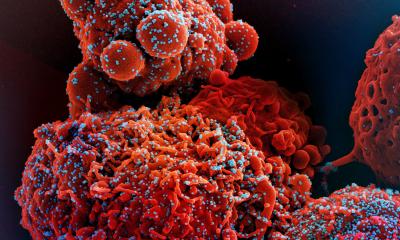
Coronavirus produces 'dummy' proteins to fool the immune system
To evade the human host’s immune response, Sars-CoV-2, the coronavirus that causes Covid-19, uses the machinery of defense cells to induce the expression of unproductive isoforms of key antiviral genes – variant forms of genes that result from disrupted splicing or transcription processes and do...
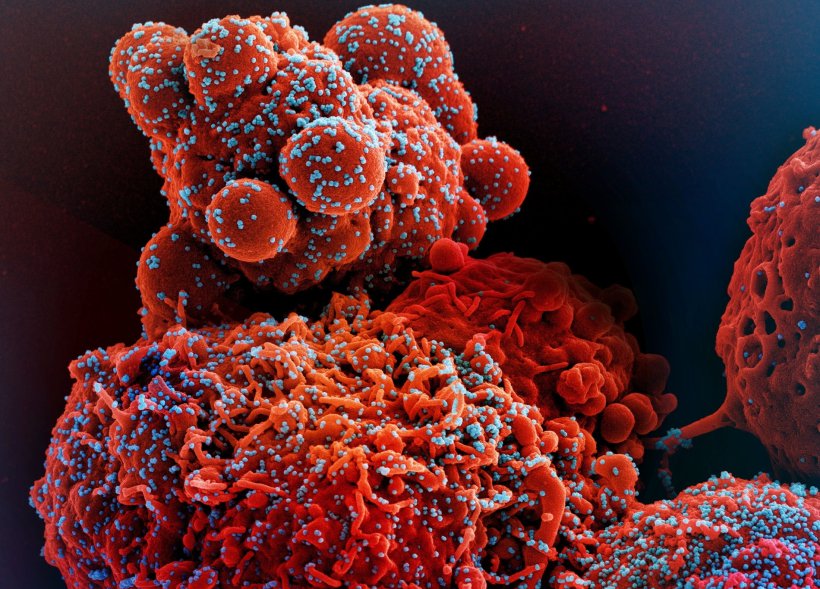
Colorized scanning electron micrograph of a cell (red) infected with the Omicron strain of Sars-CoV-2 virus particles (blue), isolated from a patient sample.
Image credit: NIAID (CC BY 2.0)
News • Sars-CoV-2 research
Coronavirus produces 'dummy' proteins to fool the immune system
To evade the human host’s immune response, Sars-CoV-2, the coronavirus that causes Covid-19, uses the machinery of defense cells to induce the expression of unproductive isoforms of key antiviral genes – variant forms of genes that result from disrupted splicing or transcription processes and do not code for functional (protective) proteins.
This is a key finding of a study conducted by researchers at the Albert Einstein Jewish Brazilian Hospital (HIAE), the University of São Paulo (USP) and the Federal University of Minas Gerais (UFMG). An article on the study, which offers a foundation for the development of novel therapeutic strategies to combat Covid-19, is published in the International Journal of Molecular Sciences.Other viruses, including coronaviruses, also distort protein production by disrupting messenger RNA (mRNA) splicing, but Sars-CoV-2 goes further by blocking expression of interferons, a family of proteins that help the immune system fight infection, and modulating specific immune cells. A lack of precise details regarding this process has been a major hindrance to the development of novel options to treat Covid-19.
Recommended article
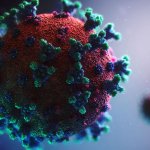
Article • Covid-19
Coronavirus update
Years after the first outbreak and spread of coronavirus Sars-CoV-2, its impact can still be felt in everyday life. Keep up-to-date with the latest research news, political developments, and background information on Covid-19.In the study, which was funded by the São Paulo Research Foundation (FAPESP), the researchers set out to confirm the hypothesis suggested in the scientific literature that production of unstable mRNA isoforms can give rise to non-functional proteins. To do this, they conducted an integrative analysis that combined several transcriptomic and proteomic datasets to arrive at a detailed characterization of the infected host cell landscape, both in vitro and in vivo. They found that infection by Sars-CoV-2 induced predominant expression of unproductive splicing isoforms in key genes linked to the immune system and antiviral response (IFN signaling genes, ISGs, class I MHC genes, and splicing machinery genes such as IRF7, OAS3, HLA-B and HNRNPH1). These genes also produced fewer “normal” proteins, which in turn were more susceptible to attack by viral proteins.
On the other hand, inflammatory cytokine and chemokine genes (such as IL6, CXCL8 and TNF) mainly produced productive splicing isoforms in response to the infection.The emergence of Sars-CoV-3, Sars-CoV-4, and so on, is perfectly plausible. The more we find out about the way these viruses work, the better
Helder Takashi Imoto Nakaya
“Although more than 50 papers on Covid-19 transcriptomics have been published, this is the first time this viral strategy has been demonstrated at the molecular level. Moreover, we used only publicly available data,” said Glória Regina Franco, full professor in the Institute of Biological Sciences (ICB) at UFMG and last author of the article.
“By demonstrating the molecular interaction between Sars-CoV-2 and the host’s splicing machinery, we provide fundamental information on potential targets for antiviral medications and immunomodulatory interventions. Our findings can be used to orient therapies that restore normal RNA processing during viral infections, for example,” said Helder Takashi Imoto Nakaya, a senior researcher at HIAE, a professor at USP’s School of Pharmaceutical Sciences (FCF), and penultimate author of the article.
Although the Covid-19 pandemic is over, new publications on the subject are always important, Nakaya said. “Novel coronaviruses can cause severe pandemics. The emergence of Sars-CoV-3, Sars-CoV-4, and so on, is perfectly plausible. The more we find out about the way these viruses work, the better,” he added.
More research on the damage caused by the virus at the molecular level is also important in light of the widespread reports of long Covid, a problem faced by millions of people worldwide and increasingly neglected.
Researchers at Indiana University and Michigan State University in the United States also took part in the study. Besides FAPESP, the funders included CAPES (the Brazilian Ministry of Education’s Coordination for the Improvement of Higher Education Personnel), CNPq (the National Council for Scientific and Technological Development, an arm of the Ministry of Science, Technology and Innovation), and the Research Pro-Rectorate of the Federal University of Minas Gerais (PRPq-UFMG).
Source: São Paulo Research Foundation; text: Julia Moióli (CC BY-NC 4.0)
22.08.2024
Yommie
Elite Member
- Oct 2, 2013
- 64,110
- 37,185
- Country of Origin

- Country of Residence

- Thread starter
- #1,941

Opinion: Why do we have to keep getting COVID?
There is a lot we could to prevent constant reinfections, but no public motivation to do so
Yommie
Elite Member
- Oct 2, 2013
- 64,110
- 37,185
- Country of Origin

- Country of Residence

- Thread starter
- #1,942
Masking returns to Laval hospitals as COVID-19 cases increase across Quebec
Over 21 per cent of tests for COVID-19 are positive in the province
CBC News · Posted: Aug 23, 2024 4:32 PM EDT | Last Updated: 12 hours agoHealth-care staff work during the COVID-19 pandemic in a Toronto hospital in 2022. (Evan Mitsui/CBC)
Social Sharing
- X
In an internal memo sent to staff and viewed by CBC News, the CISSS de Laval called on workers to wear a procedural mask when in direct contact with patients.
The COVID-19 positivity rate in Laval increased from 2.9 per cent in mid-April and to 27 per cent in mid-August.
The rest of Quebec is also experiencing a spike in COVID-19 outbreaks — with hospitalizations doubling between mid-June and mid-August, according to data from the Institut national de santé publique (INSPQ).
Hospitalizations are at their highest level since last winter, with more than 1,200 people with COVID-19 in Quebec hospitals. In recent weeks, more than 30 people have died from the virus every week.
In an email to CBC News, the Quebec Health Ministry said it is "the prerogative of establishments to put in place the measures necessary and relevant to the situation in the field."
"Facilities can now determine which situations require masks to be worn," it said.
Dr. Donald Vinh, an infectious diseases specialist from the McGill University Health Centre, lauded the Laval health board's decision to make masking when in contact with patients mandatory.
"When a patient seeks medical attention, they go with a specific medical problem, and what they do not want is to pick up an additional problem," he said, adding that masking also protects health-care professionals.
"We're already short-staffed for a variety of reasons in most health-care settings."

Dr. Donald Vinh is an infectious diseases specialist, medical microbiologist and a research clinician scientist at the McGill University Health Centre in Montreal. (Submitted by Sandra Sciangula)
The INSPQ says there are 110 outbreaks in long-term care facilities and 54 health-care centres.
Over 21 per cent of tests for COVID-19 in the province are positive, the highest rate since last December.
Experts say the virus has not yet adopted the same seasonal pattern as cold and flu viruses, both of which are more prevalent in winter.
"COVID doesn't have any seasonality," Vinh said. "It's not the same variant that persists throughout the year. Because it can continue to propagate throughout the year, you get the development of new variants."
Vaccination encouraged
In late July, Quebec's immunisation committee released recommendations on administering vaccines this fall.People aged 60 and over and immunocompromised people are encouraged to get a booster dose before fall.
"It's important that they get maximum protection as quickly as possible," said Dr. Cécile Tremblay, a microbiologist and infectious diseases specialist at the CHUM hospital in Montreal.
With the circulation of new variants, the committee recommends that people under 60 wait for the next version of the vaccine as the mRNA vaccine is no longer favoured.
"If it's less urgent, it's more interesting to have a vaccine that matches the strains currently circulating in Quebec," said Dr. Tremblay.
Yommie
Elite Member
- Oct 2, 2013
- 64,110
- 37,185
- Country of Origin

- Country of Residence

- Thread starter
- #1,943
@Sharma Ji
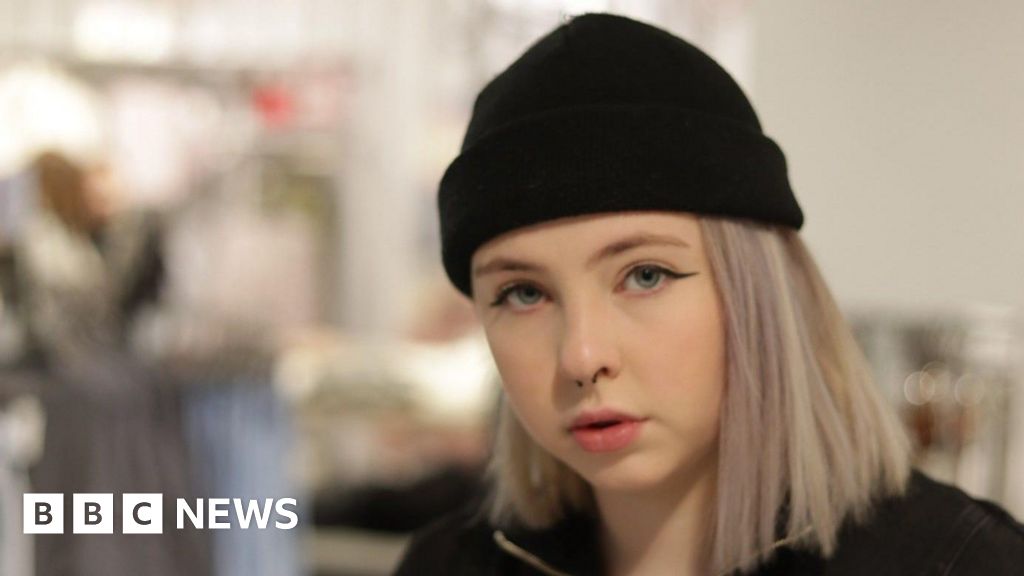
Share
Matthew Hill
Health Correspondent, BBC West of England
 BBC
BBC
Marina Waldron, 21, died of complications after being given the AstraZeneca Covid jab
The parents of a young woman who died after being given an AstraZeneca Covid jab have accused the NHS of failing to pass on known safety warnings about the vaccine.
Marina Waldron, 21, visited hospital with excruciating headaches three times in the week before her fatal collapse from a brain haemorrhage in March 2021.
Max and Liz Waldron said that despite her deteriorating condition, A&E doctors had seemed unaware of the emerging side-effects associated with the jab and warnings that had been issued.
Another family whose son, Oli Akram Hoque, died from the same complications a few days after Marina, are also calling for lessons to be learned.
A Department of Health and Social Care (DHSC) spokesperson said: "Throughout the pandemic the health system responded quickly to reports of extremely rare cases of complications following vaccination.”
The Oxford-AstraZeneca Covid vaccine was estimated to have saved millions of lives during the pandemic, but as in Marina and Oli's cases, caused rare - and sometimes fatal - blood clots.
An AstraZeneca spokesperson said the vaccine had been "recognized by governments around the world" as helping bring the pandemic to an end.

Max and Liz Waldron believe earlier awareness of the jab's rare complications could have saved Marina
Marina, from the Forest of Dean in Gloucestershire, was just starting her career in film when she was given her first dose of the AstraZeneca jab on 11 March 2021.
She had developed a headache and sickness by 22 March and went to a London hospital only to be sent home with migraine tablets, despite mentioning she had had the jab recently.
Mrs Waldron, 64, said Marina deteriorated the following day and was this time discharged by an A&E department, again with a migraine diagnosis and no brain scan.
On 27 March, her parents were so worried they took her to A&E in Gloucester. She died on 31 March at Southmead Hospital, Bristol, after suffering a heart attack and brain haemorrhage.
"We weren’t able to go in. We weren’t able to say 'don’t you understand she hasn’t drunk or eaten'. They [the hospital] just sent her back," said Mrs Waldron.
"But the next day it was worse and she started having issues with her arm - she was lifting up her arm and holding it, and that’s when it all went mad."

The family's solicitor said Marina's case fell into a gap between risks of the jab being known and frontline staff being warned
At Marina's inquest in December 2023, a coroner determined her death had been caused by a combination of factors: intracerebral haemorrhage, cerebral venous sinus thrombosis, and vaccine-induced immune thrombocytopenia and thrombosis due to the AstraZeneca vaccine.
While the coroner found Marina had died from a recognised but very rare complication of the AstraZeneca vaccine, he did not find fault with the NHS for failing to diagnose it quickly enough.
The Waldrons want to know why medical professionals were not informed about the risks associated with the vaccine earlier when other countries were putting a halt on the vaccine and why appropriate diagnostic measures were not taken promptly.
They believe that earlier awareness could have made a significant difference in Marina’s case.
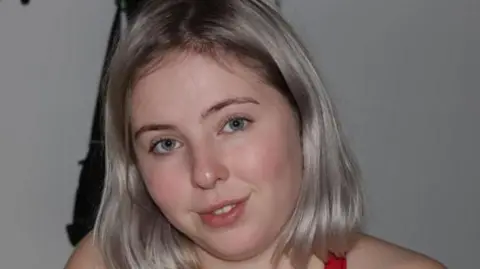
Marina had just started a career in film when she fell fatally ill
Mrs Waldron said: "It was only after a couple of days in hospital that they took us to one side and said 'we think it’s the vaccine', and we said 'we've been banging on about this vaccine right from the beginning and every single person said it wasn’t anything to do with that'.
"They didn’t even bother to scan her.
"There was a possibility, a chance she could have been saved."
Their solicitor, Lynda Reynolds from the Hugh James practice, said there seemed to have been a gap between advice being published on the government's public website on 18 March to urge people with concerns to attend A&E and clinicians being told on April 7 to investigate any potential symptoms.
She said: "Unfortunately for Marina, she fell in that gap. She's not the only one."
A week before Marina fell ill, Germany, France and Italy had halted rollouts of the AstraZeneca jab after a series of incidents in Europe involving blood clots, even though the World Health Organisation did not feel there was enough evidence to prove a link.
18 March: five cases identified of blood clots in the brain (aged 18-59) - one death
A few days later, five cases of blood clots in the brain had been identified in the UK - one of them fatal. The NHS carried on giving the vaccine to young people, although it advised anyone with a headache lasting more than four days after vaccination should seek medical advice, as a precaution.
25 March: NHS Blood and Transplant issues alert to specialist staff
The alert was issued after a rise in the number of organ donors dying from blood clots was noticed. The statement said: "I would ask you to be alert to the possibility of this syndrome in any patient within 28 days of receiving Covid vaccination with thrombosis or unexplained thrombocytopaenia."
5 April: Oli Akram Hoque goes back to hospital
Oli had been suffering from progressively worse headaches before being turned away by a GP. He died 10 days later of cerebral venous sinus thrombosis.
7 April: New advice to healthcare professionals
Advice from the Medicines and Healthcare Regulatory Authority (MRHA) mentioned a possible link between the AstraZeneca Covid vaccine and specific types of blood clot. Both families say this should have been issued earlier.
But Ms Reynolds said a side-effect of the vaccine is to make blood platelets clump together, adding: "The scan may or may not have shown what was developing.
"It was clear that Marina's platelets were continuing to deteriorate, and obviously, had she been properly assessed and reviewed, that would have been found because it was in her previous blood test."
Mrs Waldron is keen people do not forget her daughter, whose organs were donated after her death.
"We don’t want the amount of people who have died to be swept under the carpet because it's taken over three years to get to the coroner's court," she said.
"Her death had not been registered [until then] as a vaccine death.
"She was an amazing girl. She wasn’t frightened of anything."
Mr Waldron added: "We don’t know how many other people went through the same thing and died from the same thing as Marina."

Oli Akram Hoque also died after receiving the jab
Oli Akram Hoque, 26, from London, also suffered rare and fatal complications after receiving the AstraZeneca vaccine, dying from a blood clot on the brain on 15 April.
He had received his jab on 19 March 2021 and began to suffer headaches from 1 April.
His headaches became progressively worse and he went to an A&E department at a London hospital on 4 April.
At his inquest, the coroner concluded that on his first visit to hospital, Oli had not presented with any symptoms which would have required an emergency department assessment.
The next evening he was taken to the same London hospital which Marina had attended the month before with a severe headache.
He saw a GP there who did not think he needed an assessment but the next day he was rushed back to hospital after having seizures.
His sister Anika Hoque said: "He was saying 'why do I feel like this?' and he was pressing his hands... the doctor didn’t think that it was anything to be concerned about."
The MHRA told Oli's inquest that starting from 25 February 2021 it had identified three cases of blood clots to the brain associated with the AstraZeneca jab.
But the MHRA could not fully consider these cases as they did not receive all the necessary clinical information from hospitals.
The coroner raised concerns about this with the DHSC, saying the MHRA should be able to compel hospitals to give them such information as soon as possible.
The MHRA said: "Regarding the scope of MHRA’s powers to compel information to be provided by hospitals to patients, the Agency does not have legal powers to compel healthcare professionals to provide additional information."
Miss Hoque said the AstraZeneca jab had already been suspended in many parts of Europe at the time of her brother's death.
"This is information that I had to find through the internet," she added.
"My GP she said the exact same thing, so it was clear that information was available at the time but the doctors in A&E said they were not aware, which was surprising... so obviously it cost lives."
The DHSC said: “Our sympathies are with the families of Marina Waldron and Oli Hoque.
"This government is committed to learning lessons through the Covid-19 inquiry."
It said vaccines would be discussed in Module 4 of the Covid-19 Inquiry, with hearings planned to start from 14 January to 30 January.
It added the "health system quickly responded to reports from the MHRA of extremely rare cases of concurrent thrombosis and thrombocytopenia following vaccination with the first dose of AstraZeneca."
In April 2021, the Joint Commission on Vaccination and Immunisation advised adults under 30 without underlying health issues should be offered an alternative vaccine to AstraZeneca if available.
This was later extended in May 2021 to adults under 40 without underlying health issues.
"From the body of evidence in clinical trials and real-world data, the Oxford-AstraZeneca vaccine has continuously been shown to have an acceptable safety profile and regulators around the world consistently state that the benefits of vaccination outweigh the risks of extremely rare potential side effects.
“We are incredibly proud of the role the Oxford-AstraZeneca played in ending the global pandemic.
"According to independent estimates, over six million lives were saved in the first year of use alone and over three billion doses were supplied globally.
"Our efforts have been recognized by governments around the world and are widely regarded as being a critical component of ending the global pandemic.”

AstraZeneca vaccine deaths: Families ask why warnings not shared
Two families believe their loved ones would still be alive if vaccine warnings had been shared.
www.bbc.com
'Our daughter should not have died from Covid jab'
1 day agoShare
Matthew Hill
Health Correspondent, BBC West of England

Marina Waldron, 21, died of complications after being given the AstraZeneca Covid jab
The parents of a young woman who died after being given an AstraZeneca Covid jab have accused the NHS of failing to pass on known safety warnings about the vaccine.
Marina Waldron, 21, visited hospital with excruciating headaches three times in the week before her fatal collapse from a brain haemorrhage in March 2021.
Max and Liz Waldron said that despite her deteriorating condition, A&E doctors had seemed unaware of the emerging side-effects associated with the jab and warnings that had been issued.
Another family whose son, Oli Akram Hoque, died from the same complications a few days after Marina, are also calling for lessons to be learned.
A Department of Health and Social Care (DHSC) spokesperson said: "Throughout the pandemic the health system responded quickly to reports of extremely rare cases of complications following vaccination.”
The Oxford-AstraZeneca Covid vaccine was estimated to have saved millions of lives during the pandemic, but as in Marina and Oli's cases, caused rare - and sometimes fatal - blood clots.
An AstraZeneca spokesperson said the vaccine had been "recognized by governments around the world" as helping bring the pandemic to an end.

Max and Liz Waldron believe earlier awareness of the jab's rare complications could have saved Marina
Marina, from the Forest of Dean in Gloucestershire, was just starting her career in film when she was given her first dose of the AstraZeneca jab on 11 March 2021.
She had developed a headache and sickness by 22 March and went to a London hospital only to be sent home with migraine tablets, despite mentioning she had had the jab recently.
Mrs Waldron, 64, said Marina deteriorated the following day and was this time discharged by an A&E department, again with a migraine diagnosis and no brain scan.
On 27 March, her parents were so worried they took her to A&E in Gloucester. She died on 31 March at Southmead Hospital, Bristol, after suffering a heart attack and brain haemorrhage.
"We weren’t able to go in. We weren’t able to say 'don’t you understand she hasn’t drunk or eaten'. They [the hospital] just sent her back," said Mrs Waldron.
"But the next day it was worse and she started having issues with her arm - she was lifting up her arm and holding it, and that’s when it all went mad."

The family's solicitor said Marina's case fell into a gap between risks of the jab being known and frontline staff being warned
At Marina's inquest in December 2023, a coroner determined her death had been caused by a combination of factors: intracerebral haemorrhage, cerebral venous sinus thrombosis, and vaccine-induced immune thrombocytopenia and thrombosis due to the AstraZeneca vaccine.
While the coroner found Marina had died from a recognised but very rare complication of the AstraZeneca vaccine, he did not find fault with the NHS for failing to diagnose it quickly enough.
The Waldrons want to know why medical professionals were not informed about the risks associated with the vaccine earlier when other countries were putting a halt on the vaccine and why appropriate diagnostic measures were not taken promptly.
They believe that earlier awareness could have made a significant difference in Marina’s case.
'She could have been saved'

Marina had just started a career in film when she fell fatally ill
Mrs Waldron said: "It was only after a couple of days in hospital that they took us to one side and said 'we think it’s the vaccine', and we said 'we've been banging on about this vaccine right from the beginning and every single person said it wasn’t anything to do with that'.
"They didn’t even bother to scan her.
"There was a possibility, a chance she could have been saved."
Their solicitor, Lynda Reynolds from the Hugh James practice, said there seemed to have been a gap between advice being published on the government's public website on 18 March to urge people with concerns to attend A&E and clinicians being told on April 7 to investigate any potential symptoms.
She said: "Unfortunately for Marina, she fell in that gap. She's not the only one."
Could doctors have been warned earlier?
15 March: Germany, France and Italy halt Astra Zeneca rolloutsA week before Marina fell ill, Germany, France and Italy had halted rollouts of the AstraZeneca jab after a series of incidents in Europe involving blood clots, even though the World Health Organisation did not feel there was enough evidence to prove a link.
18 March: five cases identified of blood clots in the brain (aged 18-59) - one death
A few days later, five cases of blood clots in the brain had been identified in the UK - one of them fatal. The NHS carried on giving the vaccine to young people, although it advised anyone with a headache lasting more than four days after vaccination should seek medical advice, as a precaution.
25 March: NHS Blood and Transplant issues alert to specialist staff
The alert was issued after a rise in the number of organ donors dying from blood clots was noticed. The statement said: "I would ask you to be alert to the possibility of this syndrome in any patient within 28 days of receiving Covid vaccination with thrombosis or unexplained thrombocytopaenia."
5 April: Oli Akram Hoque goes back to hospital
Oli had been suffering from progressively worse headaches before being turned away by a GP. He died 10 days later of cerebral venous sinus thrombosis.
7 April: New advice to healthcare professionals
Advice from the Medicines and Healthcare Regulatory Authority (MRHA) mentioned a possible link between the AstraZeneca Covid vaccine and specific types of blood clot. Both families say this should have been issued earlier.
'An amazing girl'
During the inquest expert evidence suggested that had Marina's brain scans been carried out earlier, it would not have made a difference.But Ms Reynolds said a side-effect of the vaccine is to make blood platelets clump together, adding: "The scan may or may not have shown what was developing.
"It was clear that Marina's platelets were continuing to deteriorate, and obviously, had she been properly assessed and reviewed, that would have been found because it was in her previous blood test."
Mrs Waldron is keen people do not forget her daughter, whose organs were donated after her death.
"We don’t want the amount of people who have died to be swept under the carpet because it's taken over three years to get to the coroner's court," she said.
"Her death had not been registered [until then] as a vaccine death.
"She was an amazing girl. She wasn’t frightened of anything."
Mr Waldron added: "We don’t know how many other people went through the same thing and died from the same thing as Marina."

Oli Akram Hoque also died after receiving the jab
Oli Akram Hoque, 26, from London, also suffered rare and fatal complications after receiving the AstraZeneca vaccine, dying from a blood clot on the brain on 15 April.
He had received his jab on 19 March 2021 and began to suffer headaches from 1 April.
His headaches became progressively worse and he went to an A&E department at a London hospital on 4 April.
At his inquest, the coroner concluded that on his first visit to hospital, Oli had not presented with any symptoms which would have required an emergency department assessment.
The next evening he was taken to the same London hospital which Marina had attended the month before with a severe headache.
He saw a GP there who did not think he needed an assessment but the next day he was rushed back to hospital after having seizures.
His sister Anika Hoque said: "He was saying 'why do I feel like this?' and he was pressing his hands... the doctor didn’t think that it was anything to be concerned about."
The MHRA told Oli's inquest that starting from 25 February 2021 it had identified three cases of blood clots to the brain associated with the AstraZeneca jab.
But the MHRA could not fully consider these cases as they did not receive all the necessary clinical information from hospitals.
The coroner raised concerns about this with the DHSC, saying the MHRA should be able to compel hospitals to give them such information as soon as possible.
The MHRA said: "Regarding the scope of MHRA’s powers to compel information to be provided by hospitals to patients, the Agency does not have legal powers to compel healthcare professionals to provide additional information."
Miss Hoque said the AstraZeneca jab had already been suspended in many parts of Europe at the time of her brother's death.
"This is information that I had to find through the internet," she added.
"My GP she said the exact same thing, so it was clear that information was available at the time but the doctors in A&E said they were not aware, which was surprising... so obviously it cost lives."
The DHSC said: “Our sympathies are with the families of Marina Waldron and Oli Hoque.
"This government is committed to learning lessons through the Covid-19 inquiry."
It said vaccines would be discussed in Module 4 of the Covid-19 Inquiry, with hearings planned to start from 14 January to 30 January.
It added the "health system quickly responded to reports from the MHRA of extremely rare cases of concurrent thrombosis and thrombocytopenia following vaccination with the first dose of AstraZeneca."
In April 2021, the Joint Commission on Vaccination and Immunisation advised adults under 30 without underlying health issues should be offered an alternative vaccine to AstraZeneca if available.
This was later extended in May 2021 to adults under 40 without underlying health issues.
'Six million lives saved'
A spokesperson for AstraZeneca told the BBC “Our sympathy goes out to anyone who has lost loved ones or reported health problems. Patient safety is our highest priority."From the body of evidence in clinical trials and real-world data, the Oxford-AstraZeneca vaccine has continuously been shown to have an acceptable safety profile and regulators around the world consistently state that the benefits of vaccination outweigh the risks of extremely rare potential side effects.
“We are incredibly proud of the role the Oxford-AstraZeneca played in ending the global pandemic.
"According to independent estimates, over six million lives were saved in the first year of use alone and over three billion doses were supplied globally.
"Our efforts have been recognized by governments around the world and are widely regarded as being a critical component of ending the global pandemic.”
Sharma Ji
Banned
- Sep 18, 2012
- 24,292
- 17,143
- Country of Origin

- Country of Residence

you jabbed @Yommie ?
I might've asked earlier, but don't remember
also, @vsdoc .. we had a few heart attacks here too, one, most tragically in our society, was a girl's husband.. gym regular, no bad habits, big buff guy, my age.. died suddenly from the covid, not sure if after or before the jab though.
or maybe he had a condition that was not known.
I might've asked earlier, but don't remember
also, @vsdoc .. we had a few heart attacks here too, one, most tragically in our society, was a girl's husband.. gym regular, no bad habits, big buff guy, my age.. died suddenly from the covid, not sure if after or before the jab though.
or maybe he had a condition that was not known.
Yommie
Elite Member
- Oct 2, 2013
- 64,110
- 37,185
- Country of Origin

- Country of Residence

- Thread starter
- #1,945
you jabbed @Yommie ?
I might've asked earlier, but don't remember
also, @vsdoc .. we had a few heart attacks here too, one, most tragically in our society, was a girl's husband.. gym regular, no bad habits, big buff guy, my age.. died suddenly from the covid, not sure if after or before the jab though.
or maybe he had a condition that was not known.
I was forced jabbed with 2 Pfizers by the Ontario government. Never had another one. My heart is permanently damaged.
Yommie
Elite Member
- Oct 2, 2013
- 64,110
- 37,185
- Country of Origin

- Country of Residence

- Thread starter
- #1,948
@Sharma Ji
Personally, I don't mind the virus in the poop water as long as infections are mild.
Personally, I don't mind the virus in the poop water as long as infections are mild.
COVID-19 in wastewater: What it means for you
Sharma Ji
Banned
- Sep 18, 2012
- 24,292
- 17,143
- Country of Origin

- Country of Residence

more over Cholera@Sharma Ji
Personally, I don't mind the virus in the poop water as long as infections are mild.
COVID-19 in wastewater: What it means for you
there's a new bug in town
Bacteria will rule the world !
Pakistan Defence Latest
-
Bangladesh grants army 'magisterial powers' to restore law, order (7 Viewers)
- Latest: BananaRepublic
-
Massive 5tcf gas resource found in Bhola, valued at Tk6.5 lakh crore (1 Viewer)
- Latest: Michael Corleone
-
-
-
Country Watch Latest
-
Why India Deliberately kept Weakened Bangladesh’s Military | InShort (8 Viewers)
- Latest: Circadian Rhythm
-
-
-
Latest Posts
-
Bangladesh grants army 'magisterial powers' to restore law, order (7 Viewers)
- Latest: BananaRepublic
-
-
Why India Deliberately kept Weakened Bangladesh’s Military | InShort (8 Viewers)
- Latest: Circadian Rhythm
-
Iranian President Raisi and Foreign Minister Abdollahian die in helicopter crash in East Azerbaijan (4 Viewers)
- Latest: prothought
